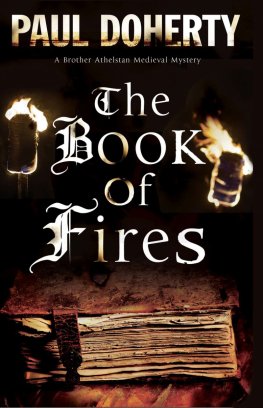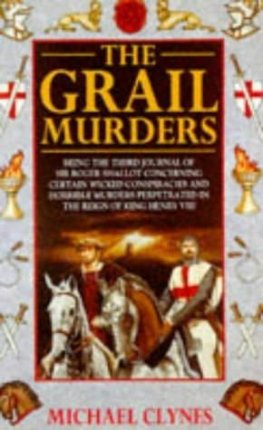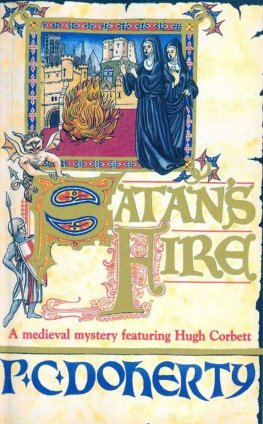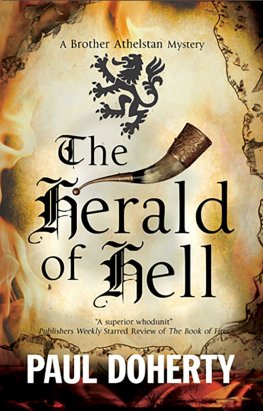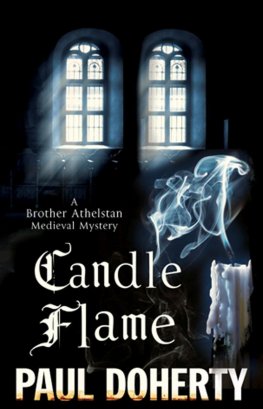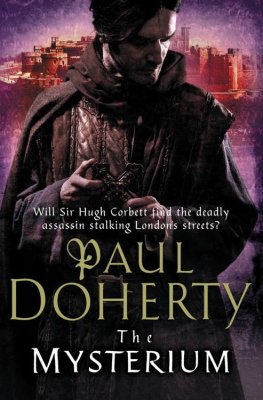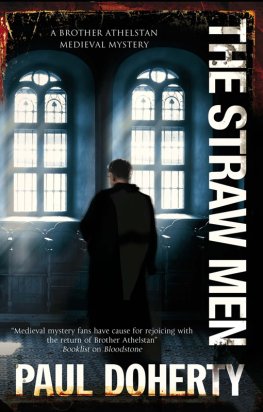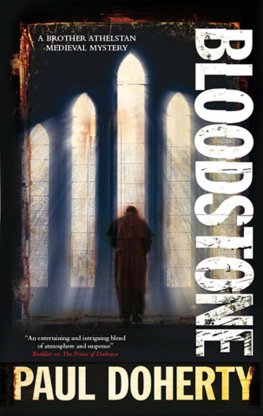Paul Doherty - The Book of Fires
Here you can read online Paul Doherty - The Book of Fires full text of the book (entire story) in english for free. Download pdf and epub, get meaning, cover and reviews about this ebook. year: 2014, publisher: Severn House Publishers, genre: Detective and thriller. Description of the work, (preface) as well as reviews are available. Best literature library LitArk.com created for fans of good reading and offers a wide selection of genres:
Romance novel
Science fiction
Adventure
Detective
Science
History
Home and family
Prose
Art
Politics
Computer
Non-fiction
Religion
Business
Children
Humor
Choose a favorite category and find really read worthwhile books. Enjoy immersion in the world of imagination, feel the emotions of the characters or learn something new for yourself, make an fascinating discovery.
- Book:The Book of Fires
- Author:
- Publisher:Severn House Publishers
- Genre:
- Year:2014
- ISBN:9781780105888
- Rating:4 / 5
- Favourites:Add to favourites
- Your mark:
- 80
- 1
- 2
- 3
- 4
- 5
The Book of Fires: summary, description and annotation
We offer to read an annotation, description, summary or preface (depends on what the author of the book "The Book of Fires" wrote himself). If you haven't found the necessary information about the book — write in the comments, we will try to find it.
The Book of Fires — read online for free the complete book (whole text) full work
Below is the text of the book, divided by pages. System saving the place of the last page read, allows you to conveniently read the book "The Book of Fires" online for free, without having to search again every time where you left off. Put a bookmark, and you can go to the page where you finished reading at any time.
Font size:
Interval:
Bookmark:
Paul Doherty
The Book of Fires
PROLOGUE
Another kind of fire for the burning of enemies where ever they are
Mark the Greeks The Book of FiresRichard Sutler, serjeant-at-law, and Crown Prosecutor in the Kings Bench at Westminster, empowered to plead before the Kings justices of oyer and terminer, was a proud, some would even say arrogant man. He was self-made, the child of marsh people from Poplar, close to the muddy waters of the Thames. Serjeant Sutler had, in his words, pulled himself up by his own bootstraps. He was, in the opinion of a Westminster wit, the sort of fellow who would cheerfully give you the shirt off your back. Another tartly claimed that Sutler knew the gamut of human emotions from A to B. Tall and commanding with a sharp, shaven face, popping-eyed with the mouth and jaw of a hungry lurcher, Sutler was in his heyday, especially on the morning of the feast of Saints Perpetua and Felicity, women of Carthage martyred by the cruel Emperor Severus in the amphitheatre of that city. Full of his own worth, Richard Sutler did not realize that on that cold, dark February morning he was about to be brutally murdered; in the words of scripture, a fate sprung on him like a trap. Death would strike like a thief in the night and Master Sutler certainly did not know the day nor the hour.
As usual, the serjeant had risen early in his comfortable chambers in Casket Lane within bowshot of the great abbey of Westminster. He had washed, shaved, oiled his skin and donned his best robes, pulling on his high-heeled Spanish boots before swinging round his shoulders a pure woollen cloak edged with the costliest ermine. Sutler collected his chancery satchel bulging with documents which, within the day, would despatch a cartload of felons to the gallows at Smithfield, Tyburn stream or even outside the towering fortified gatehouse of the abbey. Sutler was full of his day as he made himself comfortable in the whispering recess of the Gates of Purgatory, a handsome tavern which stood on the corner of Casket Lane, close to his own comfortable wainscoted chamber with its fine silver-inlaid furniture, woollen Turkey rugs, coffers, chests and aumbries, not to mention that lux-urious four-poster bed Sutler had been so reluctant to leave after the previous nights drinking here in his favourite tavern. The taproom now lay empty. People had flocked to the Jesus Mass. Once this was finished, they would come here to break their fast on strips of roasted pork and capon, dusted slightly with a savoury peppered sauce and served on the softest manchet coated with crushed spiced herbs. Sutler, however, had decided to leave matters spiritual for the moment. He wanted to prepare for the days business. Above all, he wanted to revel in his most recent triumph: the searching out, arrest, conviction and execution of Lady Isolda Beaumont, widow of Sir Walter, merchant, former soldier, adventurer and close friend of the Regent, John of Gaunt. Lady Isolda was a self-made widow. Sutler had proved that. The serjeant squirmed on the thick cushioned seat. He stretched out his hands towards the two capped braziers which had been wheeled into the comfortable corner enclave beneath one of the taprooms beautifully painted stained-glass windows. Sutler had proved how Lady Isolda had helped her failing husband through the Gates of Eternity with a goblet of rich posset generously laced with the most deadly poison. At first she had protested her innocence. An easy enough task for a beautiful young woman like Isolda with her corn-coloured hair, sloe-blue eyes and lips full and generous as the rose. She could dress in gowns of damask and samite, wear gauze veils as demurely as any nun, but she still remained an assassin. Sutler had proved that well enough, his only regret was that her accomplice, the clerk Reginald Vanner, had fled, mysteriously disappeared. Sutler comforted himself that it was only a matter of time before Vanner was seized and thrown into Newgate. Reginald Vanner, formerly clerk to Sir Walter Beaumont, had been put to the horn, proclaimed as a murderer with a bounty on his head, thirty pounds sterling if he was brought in alive, fifteen for the head only. Vanner had been proclaimed utlegatum, beyond the law, a wolfshead who could be slain on sight. Sutler sipped at the silver tankard, his own, which the taverner kept specially for him. He reminisced on his recent great triumph. He had received the personal thanks of the Regent as well as those of Gaunts nephew, the young King Richard II. Such royal gratitude had been expressed with the grant of land in Middlesex. A small manor but one with fertile fields, a well-stocked carp pond and a thick rich copse of trees.
Sutler cradled the tankard between his hands. Lady Isolda and her accomplice, Vanner, had considered themselves very subtle: their crime had been perpetrated in a matter of seconds, a few heartbeats, but serjeant Sutler had been more cunning than either
A relic, sir, a true relic from the Holy Blood of Hailes.
The serjeant glared at the tinker dressed in a motley collection of rags, a felt cap on his tattered grey hair, his scratched leather jerkin festooned with miniature cockle shells, amulets and brooches which boasted, at least in theory, that he had visited all the great shrines of the kingdom and beyond. Sutler leaned forward aggressively and the relic-seller scuttled away. Sutler returned to his reflections. Gaunt had commissioned him to investigate Sir Walters death and he had done so thoroughly, detecting Lady Isoldas very clever sleight of hand. He had closed in swiftly like any good lurcher in pursuit of a deer. He had trapped her and brought her down. Oh, the lady had tried to seduce her way out of the trap, pressing herself close, whispering all forms of sweet inducements. Sutler smirked to himself; little did she or anyone know the truth. The serjeant-at-law peered over his tankard at the svelte round buttocks of the tapboy as he leaned over a table to clear away some pots. Sutler licked his lips. No one knew where his true predilections lay. Indeed, Lady Isolda had been greatly surprised by his reaction. Sutler placed his tankard down. Isolda had been convicted: all her parry and thrust, as well as that of her lawyer Nicholas Falke, had proven futile. She had been found guilty. Justices Tressilian, Gavelkind and Danyel had imposed the ultimate horrid penalty for the murder of a husband by his wife: Lady Isolda had been sentenced to be burnt alive at Smithfield. The punishment was imposed sine misericordia without mercy. No opiate was to be offered, nor could the Carnifex, the executioner, slip through the surging smoke to garrotte her. Sutler, despite his arrogance, flinched at the memory of the burning: Lady Isolda standing on a stool, lashed to that soaring execution stake! He closed his eyes. The memories were still strong: the smoke billowing, the flames licking greedily around their victim. Sutler opened his eyes. He wondered why Lady Isolda hadnt bargained for her life. Surely she must have known the whereabouts of that secret codex, Mark the Greeks Book of Fires? A manuscript which described the devastating liquid fire that could devour an entire ship, or so they said A crackling from the hearth carved in the shape of a gaping dragons mouth caught Sutlers attention. He watched the turnspit press the creaking iron on which half a piglet was spitted. The leaping flames, the sweating boy, the way the fire scorched the white, fleshy pork brought back memories of that macabre execution. Sutler quickly finished his ale, despatched the tankard back to Mine Host, grabbed his chancery satchel and staggered out of the main door into the narrow alleyway. Sutler stood taking deep breaths. He glanced to his left. The runnel snaked before him, the muck and filth, frozen hard by a hoar frost, glittered in the grey dawn-light. Sutler glimpsed a hooded figure holding a bucket shuffle out of an enclave, one of those recesses used as a laystall where rubbish could be heaped. He peered at the shambling, awkward figure.
Font size:
Interval:
Bookmark:
Similar books «The Book of Fires»
Look at similar books to The Book of Fires. We have selected literature similar in name and meaning in the hope of providing readers with more options to find new, interesting, not yet read works.
Discussion, reviews of the book The Book of Fires and just readers' own opinions. Leave your comments, write what you think about the work, its meaning or the main characters. Specify what exactly you liked and what you didn't like, and why you think so.

